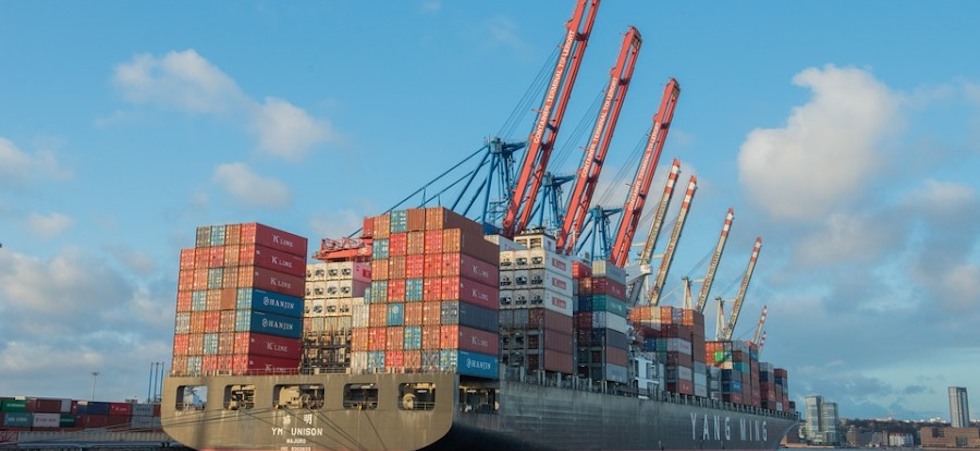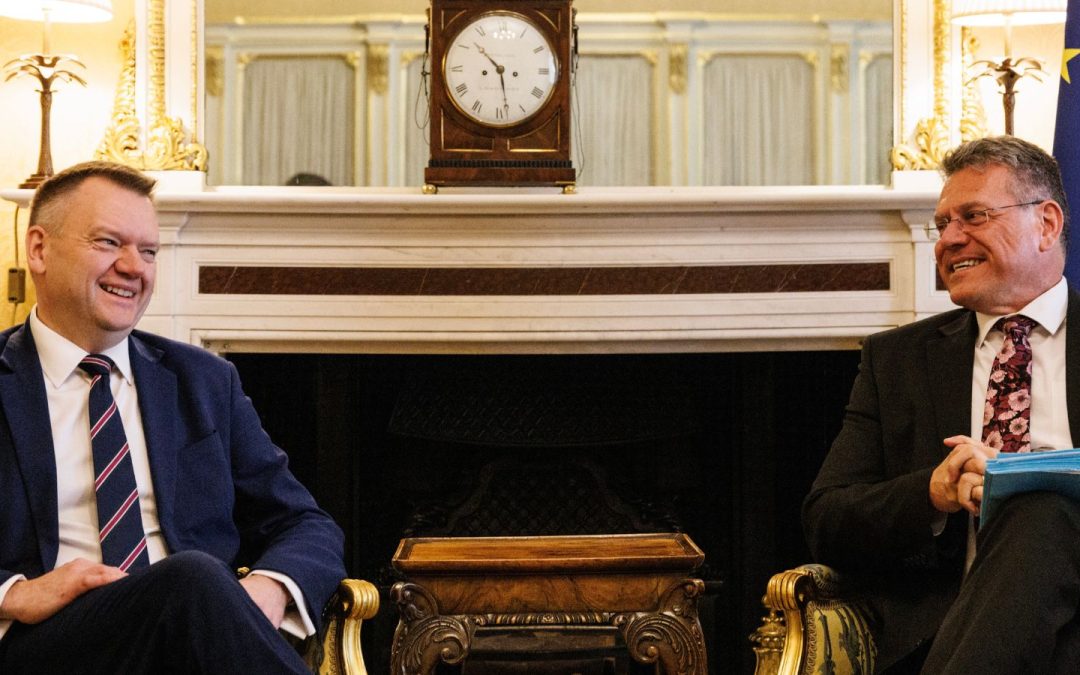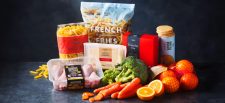The UK has secured a new SPS agreement with the European Union to reduce red tape on food imports and exports.
Announcing the agreement, Prime Minister Keir Starmer highlighted that some routine checks on animal and plant products will be removed completely, allowing goods to flow freely again, including between Great Britain and Northern Ireland. This could lower food prices and increase choice on supermarket shelves, meaning more money in people’s pockets, said Government.
The agreement will reportedly support British businesses, back British jobs and “put more money in people’s pockets”. It will have no time limit, aiming to give “vital certainty” to businesses.
After the 21% drop in exports and 7% drop in imports seen since Brexit, the UK will also be able to sell products such as burgers and sausages back into the EU again.
Government claimed that combined, the SPS and new Emissions Trading Systems linking measures are set to add nearly £9 billion to the UK economy by 2040.
Government secures fishing agreement
The UK and EU have also reached a new 12 year agreement that protects Britain’s fishing access, fishing rights and fishing areas with no increase in the amount of fish EU vessels can catch in British waters, providing stability and certainty for the sector.
The UK will back coastal communities by investing £360 million into our fishing industry to go towards new technology and equipment to modernise the fleet, training to help upskill the workforce, and funding to help revitalise coastal communities, support tourism and boost seafood exports. The British fleet will also benefit from the SPS agreement, which slashes costs and red tape to help exports.
Minister for European Union Relations and lead Government negotiator, Nick Thomas-Symonds, stated: “Today is a historic day, marking the opening of a new chapter in our relationship with the EU that delivers for working people across the UK.
“Since the start of these negotiations, we have worked for a deal to make the British people safer, more secure and more prosperous. Our new UK-EU Strategic Partnership achieves all three objectives. It delivers on jobs, bills and borders. Today is a day of delivery. Britain is back on the world stage with a Government in the service of working people.”
National Farmers’ Union
NFU president Tom Bradshaw said: “The Government’s ambition to make it easier for the sector to trade with our largest overseas partner is welcome. Of course, as always in trade agreements, the detail is king and we will be scrutinising the specifics of this deal as they become available in the coming weeks, and as talks continue between the UK Government and the EU.
“We have always sought a strong trading relationship with the EU which reduces friction at a time of global instability. But since 2020, farming and growing businesses have been faced with significant costs, burdensome paperwork and additional checks in order to trade with partners on the continent.
“The Government has clearly listened to these concerns. With the scope to remove Export Health Certificates and cumbersome controls at the border, this deal will deliver many benefits for agri-food exports to the EU.”
“Despite the benefits this deal brings, full dynamic alignment comes at a significant cost of committing to future EU rules, in which the UK will have little say.”
Bradshaw continued: “However, there remain important questions about what is within the scope of this agreement and, where current rules and regulations do differ, if there will be any exclusions. As negotiations in this area continue, it’s vital that our Government safeguards the progress we have made in policy areas such as precision breeding to enable the farming sector to continue to move forward in sustainable, resilient and innovative food production.
“We have always argued that trade with the EU must be based on equivalency. Despite the benefits this deal brings, full dynamic alignment comes at a significant cost of committing to future EU rules, in which the UK will have little say.
“We know today’s announcement is only the start of further negotiations, and we ask our Government to ensure any agreements made enable a thriving future for British farming and underpins our nation’s food security.”
NFU Scotland
NFU Scotland president Andrew Connon said: “This agreement marks a welcome shift towards reducing the red tape and costs that have frustrated Scottish farmers and food exporters for years. While details are still emerging, anything that helps restore smoother trade with our largest export market is a positive step.
“We support practical solutions that reduce friction and support our members’ ability to compete. This is about improving trade flow while maintaining high standards, not about returning to rule-taking.
“The devil will be in the detail. We need to ensure this works across all sectors – from livestock to seed potatoes and delivers real benefits on the ground. The principle of the deal is dynamic alignment with EU policy-but we need to understand what the exceptions might be and how this might work in practice.”

Agriculture and Horticulture Development Board
Sarah Baker, Agriculture and Horticulture Development Board (AHDB) head of economics, said: “Since leaving the EU, added trade friction has disproportionately impacted SME export businesses most notably with the amount of red tape creating challenges around groupage. Export Health Certificate (EHC) cost has also added an extra financial burden across the industry.
“With recent headlines highlighting trade arrangements with the US, it remains important not to overlook the EU market. The EU market is and will remain our key trading partner due to our proximity to market and established supply chains. Any agreement that lowers trade friction, smoothing trade between the UK and the EU would be good news for UK agricultural exporters.”
“Strengthening market access will benefit UK meat exporters, support food supply chain resilience, and reinforce the UK’s position as a key trading partner with the EU.”
Ouafa Doxon, AHDB head of market access, reiterated the importance of the EU as one of the UK’s largest and most valuable trading partners, adding that the trade summit presented a “vital opportunity” to advance discussions on improving market access and addressing trade barriers that have emerged since Brexit.
She commented: “New regulatory requirements, including veterinary checks, EHCs and administrative red tape have significantly increased costs and complexity for UK meat exporters, disrupting supply chains, reducing competitiveness and constraining growth.
“Ahead of the summit, I visited Calais Port to observe veterinary controls firsthand and engage with French veterinary officials. These discussions reinforced the importance of cooperation in addressing market access challenges and improving the flow of goods.
“Constructive dialogue at this summit could help streamline processes and explore solutions such as an SPS agreement, while respecting the UK’s regulatory autonomy. Such progress would be instrumental in facilitating smoother trade flows and ensuring long-term stability for the UK meat industry.
“Strengthening market access will benefit UK meat exporters, support food supply chain resilience, and reinforce the UK’s position as a key trading partner with the EU. We will continue to monitor the details as they emerge.”
Food and Drink Federation
Karen Betts, chief executive of the Food and Drink Federation (FDF), said: “Trade with the EU is incredibly important to UK food and drink manufacturers. Europe is our single biggest customer, and most of the food and drink we import – from ingredients to finished products – comes from Europe too. However, trade in both directions has become complex and challenging. UK food and drink exports to Europe have fallen by a third since 2019 and businesses continue to face challenges and delays with imports.
“We’re pleased to see today’s announcement of a much closer UK-EU trading relationship, which acknowledges our shared high standards in food and drink. A high-quality agreement will have clear benefits for consumers and businesses. However, the Government must continue to work closely with industry on the detail and ensure the UK is able to influence EU decision making where this impacts British businesses and competitiveness, particularly where the UK aligns with EU rules.”
Provision Trade Federation
PTF director general Rod Addy stated: “As a trade association primarily representing processors and traders in the meat and dairy sectors, the Provision Trade Federation (PTF) warmly welcomes the agreement to work to slash Export Health Certificates and SPS checks on agrifood. This will fix many of the trade barriers that exist between this country and its nearest and biggest customer and supplier.
“This deal is everything our members were hoping for and takes much of the cost, stress and hard work out of exports and imports to and from the EU. In particular, the lifting of checks for food shipped from Great Britain and the EU for sale solely in Northern Ireland would also simplify things for the industry. Sales of shellfish and certain areas of chilled meat would also be able to resume.
“The UK would also have the ability to retain its own rules in areas such as animal welfare and advanced technologies. And it would be able to defend its farmers better against animal diseases through better access to relevant EU intelligence on emerging risks.”

Salmon Scotland
Tavish Scott, chief executive of Salmon Scotland, commented: “We congratulate the UK Government on securing this deal with the EU, which will slash red tape and speed up the delivery of our premium salmon to market. This breakthrough eases the burden on our farmers, processors and the communities they support, and we welcome efforts to implement it at pace.
“The withdrawal of physical checks is particularly welcome. It means lower costs and quicker deliveries for our customers. Since Brexit, our members have faced costly delays and bureaucracy moving 500 lorryloads of nutritious, low-carbon salmon across the Channel every week.
“Scottish salmon is the UK’s biggest food export, with strong demand in the EU, the US and beyond. A large share of our exports to France carry the prestigious Label Rouge mark, underlining our global reputation for quality.
“We look forward to rebuilding trade ties across Europe and will continue to press for freer access to the US and other markets to support jobs and growth in our coastal communities.”
Association of Independent Meat Suppliers
Dr Jason Aldiss, AIMS executive director, stated: “We have been lobbying for the last couple of years for a common-sense approach to create frictionless trade at the border for both exports and imports from and to the UK, and to now have 100% paper work checks and up to 30% physical checks removed entirely for red meat, poultry and eggs is very welcome.
“The cost savings in terms of Export Health Certificates , especially on groupage loads, is significant. British products that were banned, such as fresh sausages and burgers, will now be enjoyed by our EU neighbours and of course within Northern Ireland as the movement of goods between GB and NI will be now far easier due to the removal of SPS and other requirements.”









